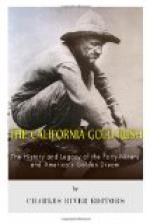The mob surged after the disappearing vehicle, and so ended up finally in the wide open space before the county jail. The latter was a solidly built one-story building situated on top of a low cliff. North, the marshal, had drawn up his armed men. The mob, very excited, vociferated, surging back and forth, though they did not rush, because as yet they had no leaders. Attempts were made to harangue the gathering, but everywhere the speeches were cut short. At a crucial moment the militia appeared. The crowd thought at first that the volunteer troops were coming to uphold their own side, but were soon undeceived. The troops deployed in front of the jail and stood at guard. Just then the mayor attempted to address the crowd.
“You are here creating an excitement,” he said, “which may lead to occurrences this night which will require years to wipe out. You are now laboring under great excitement and I advise you to quietly disperse. I assure you the prisoner is safe. Let the law have its course and justice will be done.”
He was listened to with respect, up to this point, but here arose such a chorus of jeers that he retired hastily.
“How about Richardson?” they demanded of him. “Where is the law in Cora’s case? To hell with such justice!”
More and more soldiers came into the square, which was soon filled with bayonets. The favorable moment had passed and this particular crisis was, like all the other similar crises, quickly over. But the city was aroused. Mass meetings were held in the Plaza and in other convenient localities. Many meetings took place in rooms in different parts of the city. Men armed by the thousands. Vehement orators held forth from every balcony. Some of these people were, as a chronicler of the times quaintly expressed it, “considerably tight.” There was great diversity of opinion. All night the city seethed with ill-directed activity. But men felt helpless and hopeless for want of efficient organization.
The so-called Southern chivalry called this affair a “fight.” Indeed the Herald in its issue of the next morning, mistaking utterly the times, held boldly along the way of its sympathies. It also spoke of the assassination as an “affray,” and stated emphatically its opinion that, “now that justice is regularly administered,” there was no excuse for even the threat of public violence. This utter blindness to the meaning of the new movement and the far-reaching effect of King’s previous campaign proved fatal to the paper. It declined immediately. In the meantime, attended by his wife and a whole score of volunteer physicians, King, lying in a room in the Montgomery block, was making a fight for his life.
Then people began to notice a small advertisement on the first page of the morning papers, headed The Vigilance Committee.
“The members of the Vigilance Committee in good standing will please meet at number 105-1/2 Sacramento Street, this day, Thursday, fifteenth instant, at nine o’clock A.M. By order of the COMMITTEE OF THIRTEEN.”




